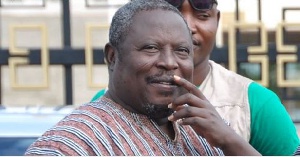The materialization of anti-corruption begins with the activities of man within the concept of laws that govern the society. Laws and statutes express the will of the people to growth and development hindered by corruption.
The New Patriotic Party (NPP) “Manifesto for Election 2016,” Chapter 12, page 135, titled ‘Governance, Corruption and Public Accountability,’ proposed “to establish, by an Act of Parliament, an Office of the Special Prosecutor”. The President’s choice of the Special Prosecutor in the character and stature of Martin Alamisi Burnes Kaiser Amidu, an ‘anti-corruption crusader’, was surprising; but it consolidates the growth of our burgeoning democracy.
The office of the Special Prosecutor will have the mandate to investigate and prosecute cases of alleged corruption under the Public Procurement Act 2003(Act 663), and other corruption-related offences implicating public officers, political office holders and accomplices.
In spite of all that, the fight against corruption is not only about prosecution. It is also about good governance and conscience. Prosecution of alleged corrupt public officers span across governments; and it is still ongoing under the current administration.
The power of prosecution is vested in the Attorney-General, in accordance with articles 88(3) and (4) of the 1992 Constitution. Following this, the appointment of the Special Prosecutor is vexed with the question of constitutionality.
The common law principle in constitutional and administrative law says that no delegated powers can be further delegated (delegate potestas non potest delegari). Alternatively, it is said that one to whom power is delegated cannot himself further delegate that power (delegatus non potest delegare).
Although the law establishing the office of the Special Prosecutor requires the Attorney-General to make the nomination of the Special Prosecutor for the President to appoint; nevertheless, it does not cure the fact of the breach of the Constitution which had imbued the power of prosecution to the Attorney-General and the Office of the Special Prosecutor has been further delegated that power of prosecution.
What is more, it also implies that the Attorney-General has a residual power over the Special Prosecutor with the doctrine of NOLLE PROSEQUI – the enormous and discretionary power to file a formal entry in criminal proceedings, declaring that the “proceedings shall not continue” on some of the counts or some of the accused persons, or altogether – making the criminal proceedings by the Special Prosecutor independent.
The appointment of Martin ABK Amidu as the Special Prosecutor and its euphoria does not answer to the constitutional defect and the demand the people are seeking in the fight against corruption. It is a semantic delusion. The substance of the law regarding state prosecution of corruption remains unchanged.
The personality of Martin ABK Amidu throws out an element in literature, the malcontent, which seems to bear with his emotionally colour – which in itself also brings to focus the category of human power play. The longest serving Deputy Attorney – General not finding goodwill with his own Party, as a member of National Democratic Congress (NDC), with his several levels of corruption allegations against the then government is believed to have been hinged upon rancor than the perceived interest of the Ghanaian people.
Amilcar Cabral once said that it is only a fairy tale one can cross a river at the back of crocodile. Unless we examine the context in which his fight against corruption is located, without seeking to settle any personal interest, the fight against corruption would be another story of “Alice in the wonderland”.
By:
Michael Sumaila Nlasia
Research Fellow
Centre for Data Processing and Geo-Spatial Analysis
Email: marcusgarvey.snr@gmail.com
Opinions of Saturday, 13 January 2018
Columnist: Michael Sumaila Nlasia















